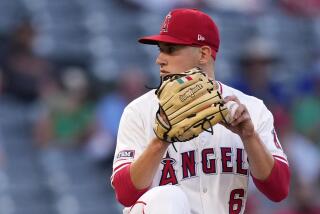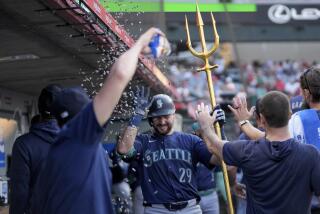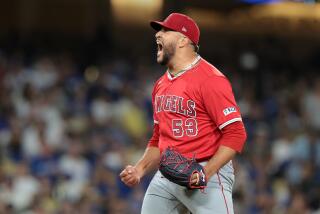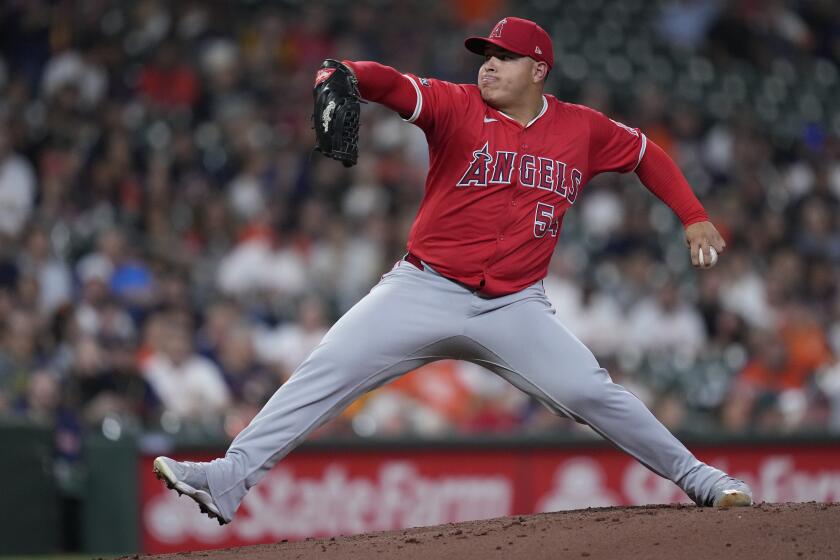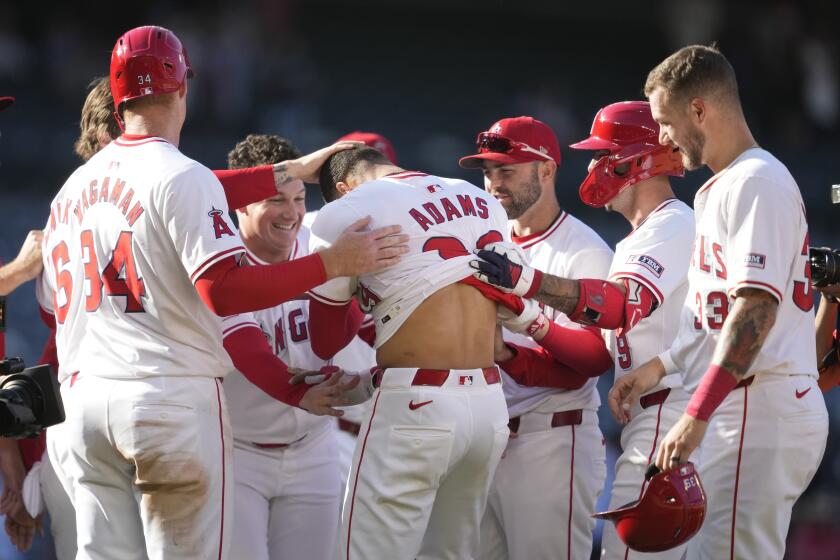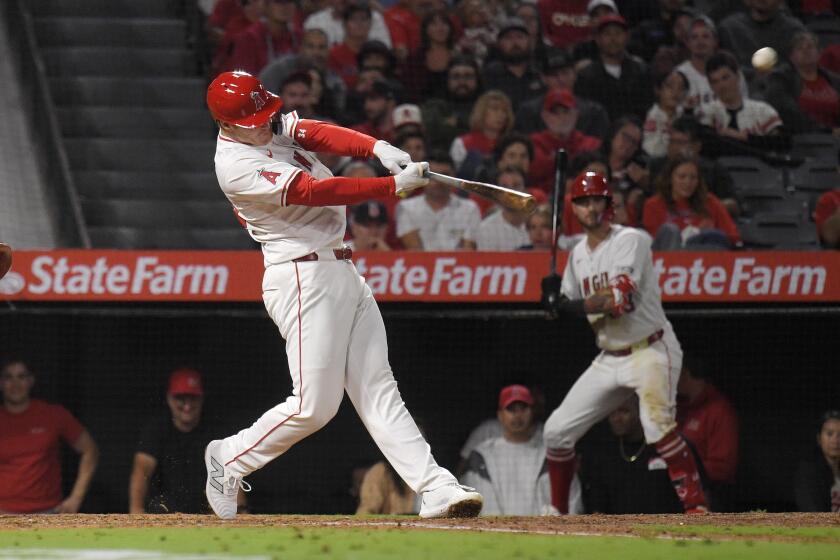It has been 20 years since the Angels’ biggest collapse
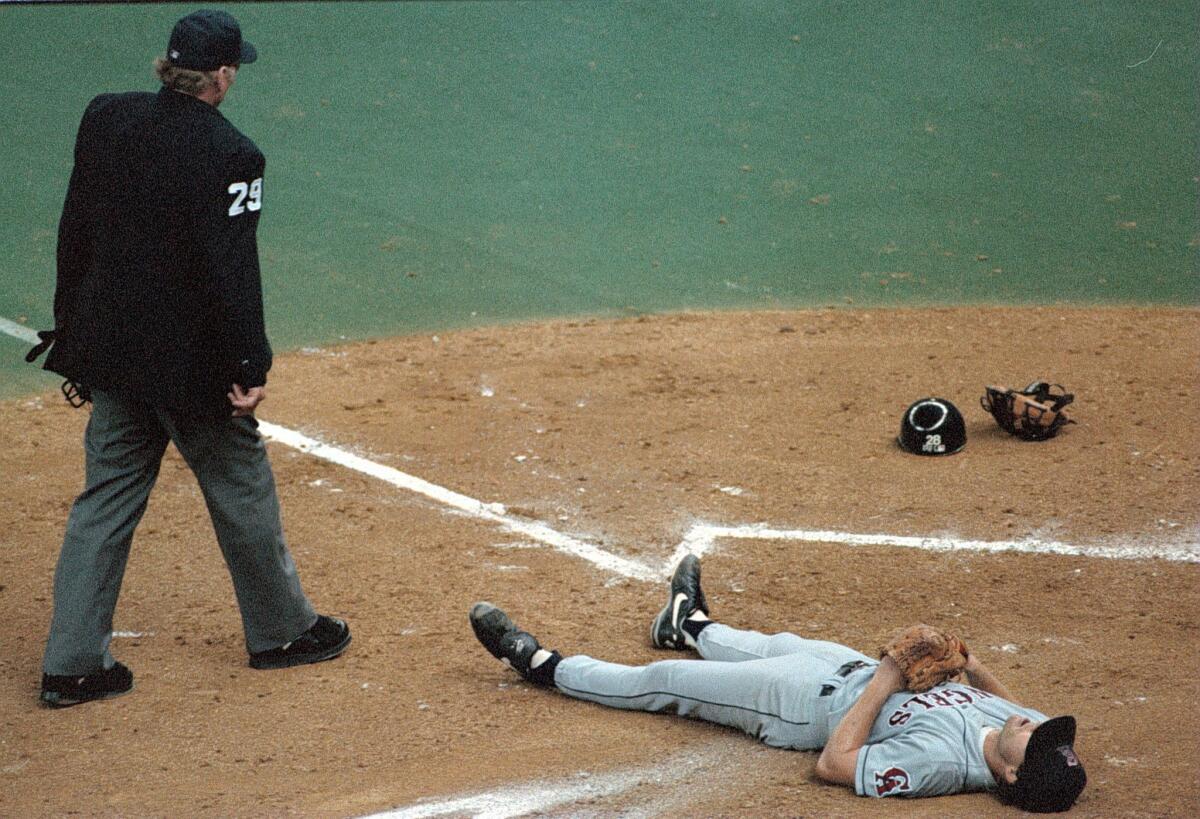
Angels pitcher Mark Langston lies dejected by the umpire at home plate after Mariners infielder Luis Sojo scored on a broken bat double with the bases loaded.
It was 20 years ago this week that Gary DiSarcina, then an All-Star shortstop for the Angels, suffered a torn ligament in his left thumb sliding into second base against the Seattle Mariners, an injury that might have triggered one of baseball’s greatest collapses.
Though the Angels lost that day — Aug. 3, 1995 — they held an 11-game lead in the American League West, one they built by winning 17 of 20 games after the All-Star break.
DiSarcina was batting .317 and providing reliable defense when he got hurt, and when he returned seven weeks later, the entire lead was gone and the red-hot Mariners stood atop the division.
“If this team can’t survive the loss of a No. 9 hitter,” DiSarcina said at the time, “maybe we’re not as good as we thought we were.”
Wasn’t that the truth? The Angels endured a pair of nine-game losing streaks in DiSarcina’s absence before pulling out of a deep funk to win their last five games and force a one-game playoff in Seattle for the AL West title.
Waiting for them in the Kingdome was Randy Johnson, a 6-foot-10 left-hander who threw a three-hitter with 12 strikeouts in a 9-1 victory that ended one of the most promising Angels seasons in years.
What happened? Five players from that Angels club — DiSarcina, pitcher Chuck Finley, outfielder Tim Salmon, infielder Rex Hudler and reliever Troy Percival — and manager Marcel Lachemann take a painful look back:
Power surge
The Angels began a strike-shortened 1995 season in late April with a mix of veterans (Finley, DiSarcina, Mark Langston, Lee Smith, Chili Davis, Tony Phillips) and promising youngsters (Salmon, Percival, Jim Edmonds, J.T. Snow).
Garret Anderson was recalled from triple A in early June, and the team caught fire in mid-July amid a Midwest heat wave that killed hundreds.
The Angels opened the second half with a four-game sweep in old Tiger Stadium, amassing 54 hits, nine of them homers, the start of a 20-game stretch in which they outscored opponents, 162-77. They soared from a first-place tie at the break to an 11-game lead on Aug. 2.
Salmon: “We were just crushing the ball. We were clicking on all cylinders.”
Percival: “We were walking up the tunnel after we won a bunch of games in a row and somebody yelled, ‘It’s official, we’re good!’ I was like, ‘OK, we’re doing something special here.’ ”
DiSarcina: “In early August, I was looking at the AL West title banners in right-center field, and they had three of them, for 1979, 1982 and 1986. We had an 11-game lead and I was thinking, ‘Wouldn’t it look good to have a 1995 banner up there?’ In a matter of 50 days, [the lead] was gone.”
Deal or no deal
As good as the Angels looked, they lacked an ace starter. All signs pointed to Toronto right-hander David Cone, who was 9-6 with a 3.38 earned-run average through July.
Finley: “We were playing the Blue Jays and David said it was a done deal, that he was going to play for us. They were going to make the trade while they were playing us.”
Not quite. Toronto wanted the Angels’ top rookies, Percival and Anderson, and then-General Manager Bill Bavasi refused to yield. Cone went to the New York Yankees, and the Angels made a deal with the Chicago White Sox to get Jim Abbott, who was good (5-4, 4.15 ERA) but not great down the stretch.
Salmon: “Everyone was hoping we would get Cone. He was the big, premier guy, and everyone was saying if we get him, it’s over. The bargaining chips were G.A. and Percy. I would love to have Cone, but not for those two guys. But looking back, I promise you, we would have snapped those nine-game losing streaks with Cone in the rotation.”
Thumbs down
For all the power the Angels had, they missed the slap-hitting DiSarcina. Four shortstops combined to hit .210 with 13 runs batted in and eight errors in 44 games in his absence.
Hudler: “He was our leader. He was very steady and got hits at the right time. We used to drive to the park together. The day he got hurt, I said, ‘DiSar, just stay healthy.’ So he thinks I jinxed him.”
DiSarcina: “It was a totally helpless and hopeless feeling being on the sideline, seeing guys try to do the job you know you can do.”
Salmon: “We went from ruling the world, doing everything right, to running out of gas. We lost our confidence, our swagger.”
Slip ‘n slide
The Angels weathered DiSarcina’s loss for two weeks and had a 10 1/2-game lead on Aug. 15, but they went into a tailspin, losing 29 of their final 43 games.
An offense that averaged 6.2 runs a game through Aug. 15 averaged 3.9 runs the rest of the way. A rotation of Finley, Langston, Abbott, Brian Anderson and Shawn Boskie combined to go 10-24 with a 6.35 ERA.
The Angels fell into an endless rut of falling behind early, and the bullpen buckled. The Mariners welcomed injured center fielder Ken Griffey Jr. back and went 22-8 from Aug. 24 to Sept. 26.
Percival: “If we hit, we didn’t pitch. If we pitched, we couldn’t hit. We went from world-beaters offensively to not scoring runs at all, and if we did, we gave up four or five runs in the first inning.”
DiSarcina: “Everyone tried to hit a three-run homer with no one on base. The pitchers tried to throw no-hitters instead of letting their talent play out.”
The low points were the nine-game losing streaks from Aug. 25 to Sept. 3, when the Angels were outscored, 71-28, and Sept. 13-23, when they were outscored, 57-27, and went 75 innings without a lead.
Hudler: “That’s the most pain I’ve ever felt as a player in my life. … We would look at each other, shake our heads, stay after the game for hours, come back the next day all fired up, and things wouldn’t work.”
Lachemann: “If there’s anything I would have done differently, I would have tried to get them to relax a little more.”
Hudler: “Not that we needed a cheerleader, but Lach was angry, mad, and so were we. We needed someone to relieve that tension.”
Recovery run
Three games behind the Mariners with five to play, Finley won, 2-0, at Seattle on Sept. 27. The Angels closed the regular season with a four-game sweep of Oakland at home to pull even with the Mariners. They seemed to regain their swagger as they left for Seattle.
Lachemann: “Teams with lesser makeup probably would have ended up eight behind, but they battled. I have nothing but respect for them.”
DiSarcina: “We walked to the team buses and there were thousands of fans out there screaming, yelling. I remember that feeling of pride. We still had a chance.”
Hudler: “We believed we were going to beat [Randy Johnson]. We had all the momentum.”
‘Big Unit’ rules
It took one at-bat — Phillips’ infield popup — in the playoff against Johnson, who was 18-2 with 294 strikeouts, for the Angels to lose that momentum.
DiSarcina: “I was hitting second and Tony said, ‘You better get your … ready. He’s blowing.’ Randy’s first pitch to me, I never saw it. I heard it go by me for a strike. ‘Pfffft!’ We were in trouble.”
Langston kept the Angels in the game, giving up one run through six innings. But Seattle loaded the bases in the seventh, and Luis Sojo’s broken-bat squibber got by Snow at first and rolled down the line.
Two runs scored as Salmon fished the ball out from under the bullpen bench and threw home. Langston cut off the throw and threw wildly past catcher Andy Allanson as a third run scored.
Sojo rounded third and slid safely into the plate for a 5-1 lead, upending Langston, who remained on his back for about 10 seconds as the crowd went wild. “The whole game flashed before my eyes right there,” Langston said.
Finley: “I’m watching guys round bases and thinking, ‘Did that thing go into a storm drain, or what?’ You couldn’t have taken a putter and lay that thing better down the line.”
Seattle added four more runs in the eighth, and Johnson, the future Hall of Famer, ended the game with his fourth strikeout of Salmon, the Kingdome erupting and fans pouring onto the field.
Salmon: “I still see highlights of Randy throwing his arms in air after that strikeout. That was my lowest feeling of dejection. And I had a good season.”
Postscript
The Mariners beat the Yankees in a thrilling division series before losing to Cleveland in the AL Championship Series. Their historic comeback and first playoff run invigorated their fan base and helped save baseball in Seattle, where retractable-roof Safeco Field was soon built.
Hudler: “I’ll never forget walking to the bus in the Kingdome. All the people were gone and my ears were still ringing — they did for a couple of days, because that was loudest venue I’ve ever played in. I thought, ‘Good for them.’ They talked about contracting that team, moving them to Tampa Bay … Safeco Field is there because of that one playoff win. We got that stadium built for those guys.”
Seven years later, Anderson and Percival helped the Angels win the 2002 World Series, Anderson providing the decisive three-run double and Percival the save in a 4-1 Game 7 victory over the San Francisco Giants.
Salmon: “Wouldn’t you know, the two guys who were the trade chips in 1995 were the reason we won Game 7. I look back and say, ‘Wow, Billy Bavasi probably took a lot of heat for not making that trade,’ but it was a godsend in securing two players who were key in 2002. Winning the World Series definitely put to bed any of the demons in the closet from 1995.”
Twitter: @MikeDiGiovanna
More to Read
Go beyond the scoreboard
Get the latest on L.A.'s teams in the daily Sports Report newsletter.
You may occasionally receive promotional content from the Los Angeles Times.

